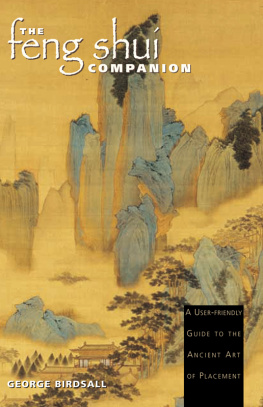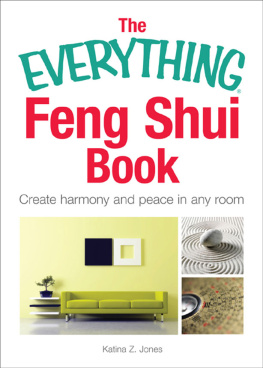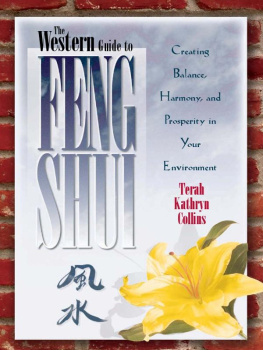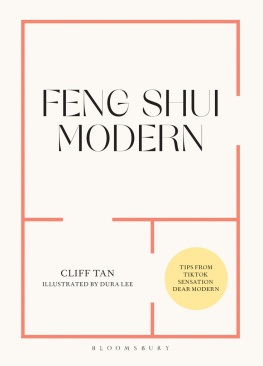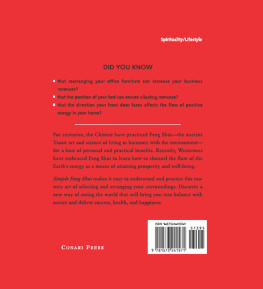
DEDICATION
This book is dedicated to all the people who have inspired this books production.
ACKNOWLEDGMENT
Many people have helped in the production of this book. However I would like to make special mention of the advice and editing skills of Shelley Neller with the original manuscript and the final checking by Geoff Piper in the frantic days before going to the printer.
Preface
I first became aware of feng shui about 10 years ago when a $20 million project I was building in Sydneys Chinatown district was assessed by a Chinese geomancer and feng shui practitioner. His major recommendations included the realignment of the escalators so that the wealth did not flow out and a delay of one week before we could start demolition and construction. We were allowed to start on a particular day, at a particular time and to demolish only three bricks before going off to have a celebratory lunch with Chinese dignitaries. We started proper demolition the next day.
Like most Westerners this seemed strange to me at the time as my focus was on more practical concerns, but we went along with it as we were advised that the Chinese community would not lease a building with bad feng shui.
My subsequent experiences have demonstrated that feng shui can have a clear and definable use in business development, commercial building, home and interior design in modern western culture. It can be applied in both new and existing buildings, often without significant cost. In buildings where the principles have been applied people have reported coincidental changes to various aspects of their fortune and health.
The aim of this book is to provide a starting point for anyone with an interest in feng shui or Chinese geomancy. It has been written to give the layman an understanding of feng shui and bridge the gap to the more advanced books written by various authors. It has come about because I have been constantly asked during my feng shui seminars and consultations to recommend a book on feng shui, which could clearly explain the key concepts to anyone with a interest in the subject.
I hope this book will inspire you to apply the key concepts of feng shui in ways that may allow your life to flow more easily. What feng shui and geomancy provide is one method for enhancing your life. Do not expect feng shui to give you all the answers to your problems. If you apply it wisely, with some humour and discernment, you can achieve better results than if you are too serious or greedy about the application. I would also add that even greater benefits often appear to flow for people who are simultaneously developing the physical, mental and spiritual aspects of their lives.
The bottom line is to trust your intuition, enjoy applying feng shui and geomancy and use this ancient knowledge prudently in your modern situation. Remember: Put a little feng shui and geomancy into your life, not your life into feng shui and geomancy.
George Birdsall
Introduction
Feng shui is an ancient Chinese system of rules, concepts and principles that endeavours to explain the impact on peoples lives, of the layout and design of their homes and businesses, and the environment around them. It is about creating a living and working environment that is balanced and harmonious. In Chinese language feng shui literally means wind and water. The wind provides the movement or flow of universal energy or chi which affects everything. The water provides the container or receiver of chi. Feng shui principles are designed to harmonise the wind and water influences.
Feng shui is also known as Chinese geomancy. It encompasses what Eastern philosophy refers to as the chi flow or energy flow within a building. This concept is not dissimilar to the chi flow within the human body upon which acupuncture is based. According to this philosophy if chi flows evenly through your body, you are generally healthy. Therefore if chi gently flows through your home or business, then your life appears to flow more easily and luck, fortune or good coincidences come your way.
One purpose of applying feng shui concepts is to create a place where you want to spend time, rather than a one from which you are constantly trying to escape because something doesnt feel right. If the places where you spend a lot of time feel pleasant, this will have an affect on your general attitude to life, and on everyone who comes to your home or business.
You may intuitively know something feels wrong about a place, but are at a loss to explain those feelings. You may also have observed situations in which peoples luck or health altered following a change of home or business premises. Feng shui proposes some answers to why these situations occur. It also provides some simple solutions to improve the flow, balance, harmony, wealth, health, fame, relationships, career and creative aspects of peoples lives. Seemingly inconsequential feng shui adjustments can sometimes radically affect how you feel about your surroundings.
Exactly why feng shui works, continues to be a mystery to our twentieth century minds and anyone approaching the use of this knowledge from a logical or left brain approach is bound to be disappointed. Feng shui involves a more right brain approach, using intuition and feelings. Remember that the application of feng shui principles are based mostly on observation, reflection and common sense. Feng shui offers us techniques to express what we are feeling intuitively about a place. So when you walk into a place which doesnt feel right, instead of dismissing that intuitive feeling, you should be able to look around and assess what might be contributing to your feelings of unease. If it is a place that you can change, then make the appropriate feng shui alterations, and then observe over time the impact of these changes, whether profound or subtle. Also note how your friends or customers react. Many people report that after making feng shui changes, friends or clients have walked into their homes or business and insisted that the place has been renovated, painted or had some other major physical change. The visitors can feel the change, but because of their conditioning, they are looking for physical signs of the change, rather than understanding that subtle inexpensive changes can also have an impact. This idea of the impact of the visible as well as the invisible environment on our lives will be discussed in .
The following chapters contain stories about the significant changes experienced by various clients after a feng shui consultation. However, not everyone has had large changes occur, and some of the changes are so subtle, that without someone else independently commenting about the changes, you may not even notice them. Sometimes the application of feng shui has done no more than make the persons house feel like a home or allow them to get a good nights sleep.
This book does not delve into great depth about every situation that could possibly arise, as it would be impossible to do that; rather it is intended as an introduction to the key concepts so that you can begin to apply them to your place in an intuitively personal way. Rather than asking you to adhere to the rule book for specific solutions to every feng shui problem you encounter, this book should be seen as a basis and guideline for the application of this knowledge.
The book begins by reviewing the history of feng shui and geomancy and the philosophical approach on which it is based. The key concepts of feng shui are outlined in the remainder of the book. Appendices B and C summarise information on how Electromagnetic Fields and Natural Earth Energies may also be affecting the feel of your home or business and the health of its occupants. Appendix D includes information on dowsing techniques that allow the energy or chi in your place to be found and adjusted more easily.
Next page
